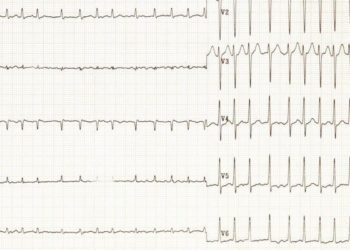Prenatal alcohol-induced developmental delay is dose and time dependent
Image: PD
1. First trimester heavy alcohol exposure was associated with reading ability below the national benchmark, while binge drinking late in pregnancy was associated with writing scores below the national benchmark.
Evidence Rating Level: 2 (Good)
Study Rundown: Alcohol use in pregnancy has previously been linked to learning delays. However, only one prior study has looked at the effect of quantity and timing of prenatal alcohol exposure on standardized measures of learning in children. To assess the importance of quantity and timing of alcohol consumption during pregnancy, this study used data from standardized exams as a measure of reading and writing ability for eight and nine year olds of mothers randomly surveyed after giving birth. Researchers found that children with exposure to self-reported heavy alcohol use during their mothers’ pregnancies were less likely to achieve a passing reading score on national exams. In addition, binge drinking later in pregnancy was associated with writing scores below national standards. This study is limited by small sample size. However, the study adds to previous research highlighting the consequences of heavy drinking during pregnancy and further emphasizes the importance of prenatal counseling to prevent the effects of fetal alcohol exposure.
Click to read the study, published today in Pediatrics
Relevant Reading: Fetal Alcohol Spectrum Disorder
In-Depth [retrospective cohort study]: 4719 students from Australia were included in this study. Student performance on The Western Australian Literacy and Numeracy Assessment (WALNA) were compared with cohort data from the Randomly Ascertained Sample of Children Born in Australia’s Largest State study (RASCALS). Alcohol use in the RASCALS study was self-reported 3 months after delivery and then categorized into low, moderate, binge drinking (over 50g alcohol per occasion), and heavy drinking (over 7 standard drinks per week including binge drinking weekly or more). Children exposed to heavy alcohol use in the first trimester were found to be twice as likely to not achieve the benchmark for reading in the third year when compared to the referent group, children of mothers that consumed alcohol before pregnancy but abstained during (OR 2.26; 95% CI 1.10-4.65). In late pregnancy, children exposed to binge drinking were twice as likely to not reach the national standard in writing when compared to the referent group (aOR 3.25; 95% CI 1.04-5.43).
By Laurel Wickberg and Leah H. Carr
More from this author: European primary care lacks confidence in obesity management, Acellular Pertussis vaccine less effective than whole-cell vaccine, Teens who text and drive take other driving risks, TV associated with higher BMI in teens, American Academy of Pediatrics updates its Medicaid Policy Statement, Children with infected family/classmates more likely to contract warts
© 2013 2minutemedicine.com. All rights reserved. No works may be reproduced without written consent from 2minutemedicine.com. Disclaimer: We present factual information directly from peer reviewed medical journals. No post should be construed as medical advice and is not intended as such by the authors or by 2minutemedicine.com. PLEASE SEE A HEALTHCARE PROVIDER IN YOUR AREA IF YOU SEEK MEDICAL ADVICE OF ANY SORT. Content is produced in accordance with fair use copyrights solely and strictly for the purpose of teaching, news and criticism. No benefit, monetary or otherwise, is realized by any participants or the owner of this domain.







